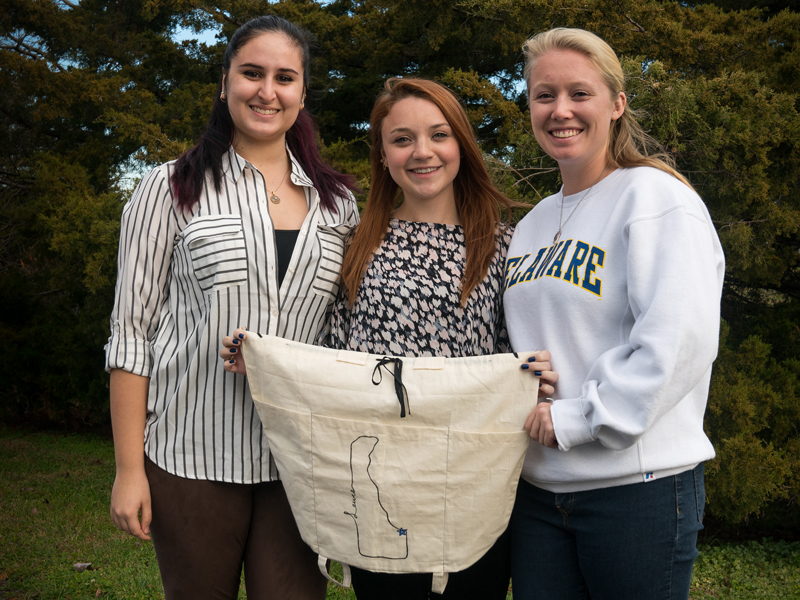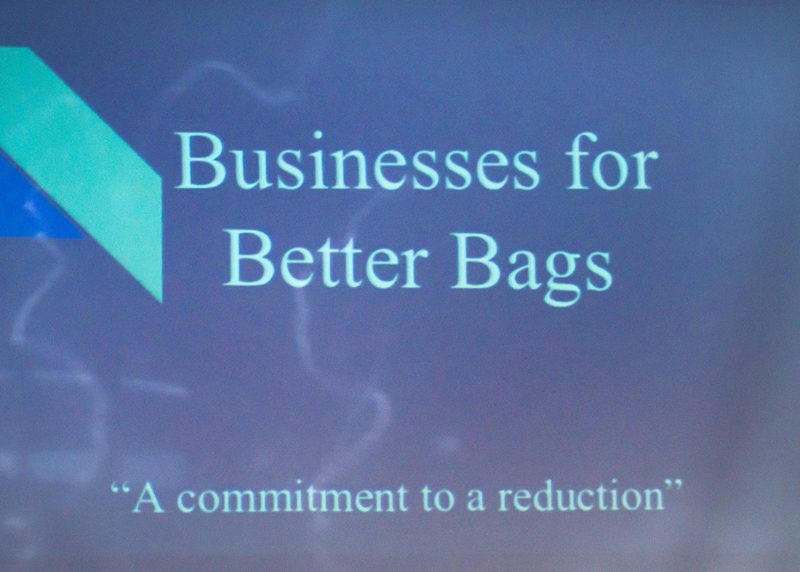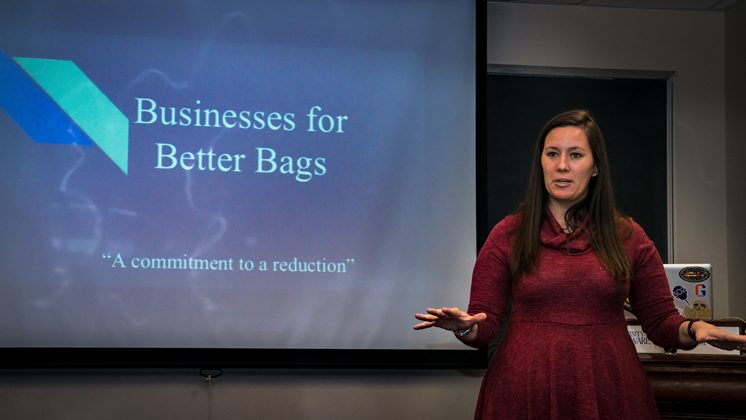


Students target single-use plastic bags in Lewes
Photo by Michael Graw December 21, 2017
Marine studies and fashion design classes join to suggest alternatives for shopping bags
Each year in the United States, 12 million barrels of oil are used to make 380 billion single-use plastic shopping bags. On average, these bags are used for 12 minutes, but they take 500 years to break down.
Students in the University of Delaware master’s seminar called Debating Marine Conservation this fall discovered single-use plastic bags are a local problem as well. Plastic bags are the second most common beach litter in Delaware (after cigarette butts). In a survey that the students conducted in Lewes, Delaware, two-thirds of people said they sometimes or always take plastic bags when shopping, but only 38 percent return them to large retailers for recycling.
In addition to being unsightly, the plastic bags can kill marine life that mistake them for food or get entangled in them, and students initially wanted to advocate for a ban on businesses giving the bags out at all, as has been done in places around the country, most recently in Boston. As they surveyed the Lewes community, the students realized that it wouldn’t be practical to start with a ban, and they adapted their approach to something that ended up generating a great deal of interest when the students presented their ideas to Lewes community members who attended a presentation at UD’s Hugh R. Sharp campus in Lewes on Dec. 7.

“We live in Lewes. We’re members of the community. We shop in your stores, and we really care about the future of this town,” graduate student Emily Ruhl said to business owners at the presentation, which she conducted with fellow student Paul Leingang. “We need your help. What we are proposing is to form a voluntary coalition of businesses in downtown Lewes who are committed to reducing their plastic bag usage.”
Danielle Dixson, an assistant professor of marine science and policy in UD’s College of Earth, Ocean, and Environment taught the master’s level course at the Lewes campus.
By committing to move along a continuum from a bag with every purchase to no bags at all, business owners could join such a coalition, which the students proposed calling Businesses for Better Bags, or B3. For some businesses, it might mean only providing bags when customers buy a certain number of items, while others could choose to ask every customer whether they want a bag or not. And for everyone, the goal would be to change behavior and end up giving out as few plastic bags as possible.
Business owner Jen Mason of Biblion Used Books & Rare Finds was initially resistant to the idea, pointing out plastic bags serve a real purpose in protecting her customers’ purchases on rainy days. But she always asks customers if they need a bag, sells Biblion reusable bags, and would like to see Lewes make progress in reducing plastic bag use. She was happy to hear that the students listened to concerns she and other business owners expressed.

“Most of us want to see something like this,” Mason said. “It could be powerful and a positive idea for our town.”
The students’ research seemed to bear that out: 62 percent of survey respondents said they would be more likely to shop at stores working to reduce plastic bag use. Students in the class thought there might also be value for B3 businesses if they all had a reusable bag to sell that promoted the town and catered to Lewes pride.
The Marine Studies students shared their survey results and talked about the potential for a branded reusable bag with students in UD’s Fashion and Apparel Studies department, which is part of the College of Arts and Sciences. The fashion students were taking a class called Interdisciplinary Approaches to Creative Problem Solving, and they embraced the chance to work on a real-world project.
“My students are very interested in sustainability and social responsibility,” Professor Belinda Orzada said. “All semester we’ve been looking at different critical issues within the industry, with environmental sustainability being one of those.”
Her students created four possible reusable bags that Lewes businesses could sell, offering options ranging from shopping bags made of a eucalyptus-based fabric that would decompose after six months to a canvas bag that converts to a backpack and features an outline of the state with the word “Lewes” written along the western edge and a star on the town.
A lively question-and-answer session following the presentation included questions around practicality, cost and the potential for voluntary success in Lewes to lead to bigger successes against plastic bags statewide, where attempts to ban them have failed in past years.
Michael Alushin, a member of the green team at St. Peter’s Episcopal Church in downtown Lewes, whose perspective the students had enlisted early on in their project, said that his group will work to move the idea forward, possibly raising money to help pay for an initial order of reusable bags. And while he was excited about the project’s potential to impact sustainability in Lewes, Alushin was most impressed by how well the students engaged the community, adapted their thinking and communicated both their research findings and their ideas for action.
“It’s important for scientists to learn to communicate with the public,” Alushin said. “We as a society need our scientists to help us inform public policy and be active citizens.”
Dixson said the point of the Debating Marine Conservation course is to teach students how to communicate science to the public in a succinct and understandable way. Adding a project-based learning component this semester, Dixson said, allowed the students to go beyond talking “and do something.”
For Ashley Barnett, a senior from Bear, Delaware, and the lone undergraduate in the class, the opportunity to take action was a big motivation to take the class. Like those at the presentation hoping a successful Lewes project could inspire change statewide, Barnett is excited for the possibility and thinking about how to do her part.
“I’m taking this as my responsibility, to take this back to Newark, in my personal actions. It’s important to start small and grow larger,” she said. “This town is so eco-friendly. This is a good town to get started in. There is a lot of promise in Lewes.”
Contact Us
Have a UDaily story idea?
Contact us at ocm@udel.edu
Members of the press
Contact us at 302-831-NEWS or visit the Media Relations website

